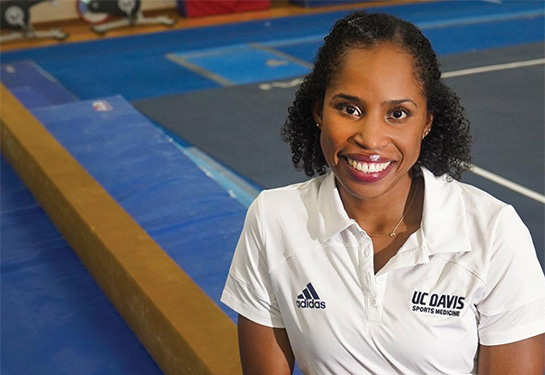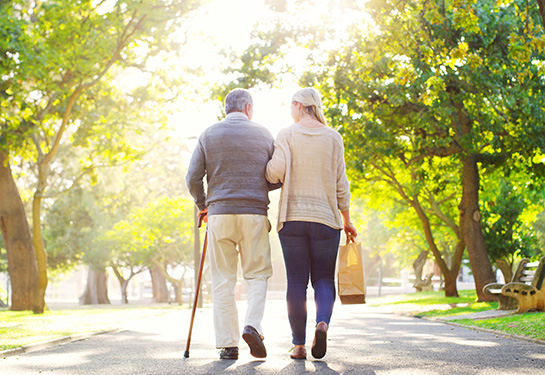Protecting athletes’ mental health from social media risks
A Q&A with Marcia Faustin, sports medicine physician for the U.S. Gymnastics Team
Recently, U.S. Surgeon General Vivek Murthy wrote an op-ed in the New York Times to raise the alarm about the impact social media is having on the mental health of our youth. Young athletes, especially those in elite sports, are at a higher risk for mental illness.
To better understand this, we interviewed UC Davis sports medicine physician Marcia “Marcy” Faustin. Faustin, the co-head physician for the U.S. Gymnastics Team, has cared for star athletes like Simone Biles and Sunisa Lee. She practices at the UC Davis Health Sports Medicine Clinic in Sacramento and is headed to the Summer Olympics in Paris this year.
What do you advise athletes to do in terms of social media use around competitions?
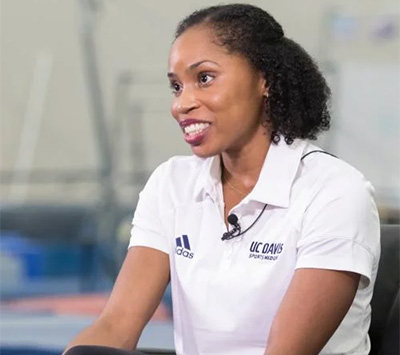
I take care of athletes at all levels, from recreational levels to the young 4-5-year-old kiddos, all the way up to the collegiate level, and then at the Olympic level. Across the board, my message is to be mindful of how much time you spend on social media. Then, before you have a competition, it may not be the best idea to hear so many people's opinions about what can go wrong.
We advise them to really focus on their community and the people they trust. They can talk to them about their fears and concerns, their anxieties of the competition that appropriately are there.
And even for some of the gymnasts, especially the Olympic level gymnasts, I tell them: Even for just an hour, don't look on social media before your competition. Allow yourself to sit in it. Afterward, see how you feel about it before you take on, without exaggeration, billions of comments about how your performance went.
Who do athletes go to when they are facing online backlash or are being targeted?
They mainly go to their trusted sources. These may be their parents, teammates who understand what they're going through and coaches with whom they spend most of their time. They will also come to the medical staff, their athletic trainer or whoever that trusted person may be. Sometimes, if there is a need to escalate and for somebody to know to stop online bullying or what may be happening, then we can raise those concerns.
How can sports medicine physicians help athletes cope with the pressure from traditional media and social media?
First and foremost, it is important for sports medicine physicians to understand the significant impact that both traditional and social media can have on athletes. These athletes are already going through a lot, especially for those with more visibility. And people aren't always very kind.
We need to be aware and mindful of those negative impacts, so we can help guide our patients through them.
Do you find any social media bias among athletes in terms of gender and race?
There are a lot of biases, whether that's racial and ethnic, sexual orientation or gender biases. People experience that in their everyday lives, and I don't think it's any different for social media.
We know for women, there is the pushing of this ideal of what their bodies should look like, especially when you're in an aesthetic square or square that reveals a lot of you. But we can't forget that men also face similar pressures to look a certain way in line with what some consider normal.
Also, when you're in a minoritized group, you can be targeted even more than others. And that, I think, could be difficult. We can see that with those who are racially different, or the Black females, or those from other countries or religious or political beliefs. So, I think whenever you are a little bit different from the majority, it can create a target on your back.
What are some ways that athletes can protect themselves from the pressure and negativity that comes from both social media and traditional media, especially during press conferences?
I think they need to be mindful of how much they take in. There's a lot of information that is at our fingertips constantly. Even myself, the news is sometimes really depressing, and I just need to take a break from that. Our social media consumption is too high. It's similar for our patients and athletes. We need to be mindful of that.
There are times when athletes are obligated to do press conferences. We remind them that they do not have to answer every question. The medical team, their coaches, the high-performance staff, whoever that person of authority may be, can remind them that even though there are pressures from media to reveal more of yourself than you want to, they don't have to do so.
We’ve seen athletes in different sports come out to talk about their mental health. Does it encourage people, especially athletes, to seek help when someone famous stands out to say they’re struggling or pulling out from this competition?
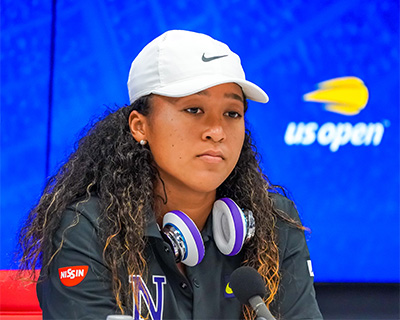
I think it's powerful. Vulnerability is powerful. It shows bravery. It shows self-awareness. It shows a willingness to put yourself out there to help other people around you. And we've seen it across the NBA, NFL, Olympic sports, and in pro tennis like Naomi Osaka — really across the board. It allows people to feel less isolated and less like they're on an island alone and they're the only ones with these feelings. It gives them a space to say, ‘I do need help’ and ‘I'm not OK right now’ because these other people can also do that, and they are still respected and great at what they do. And I think it opens the door for more people to ask for help, which is beautiful.
Mental illness is now a national public health crisis. As a physician, do you think athletes sharing their own struggles publicly helps to destigmatize mental illness for all?
I think what the athletes are doing is focusing on being themselves, and in that process, they are inspiring those around them to also speak out and to feel comfortable within themselves. For us as sports medicine physicians and physicians in general, we have to recognize that there is a biopsychosocial aspect of caring for patients. All three aspects are important to their entire well-being.
U.S. Surgeon General, Dr. Vivek Murthy has written a full proposal about social media and mental health. This topic has been a big focus for him.
Is there something from a health care perspective that you would like reporters to know or wish they would be mindful of when interviewing these athletes?
I had an opportunity to write a paper in the British Journal of Sports Medicine about this. I urge reporters to remember that these are humans they're speaking to. I tell them sometimes they are children or teenagers or young adults that you're interviewing. And to think about, how would you like it if your family member was posed that question at a devastating moment in their lives? How might that impact them?
Something within medicine that we're doing a lot of is trauma-informed care. Don't create more trauma for somebody when they are brave enough to express themselves to you.
It helps to have some background training in that and how people can be impacted by how you pose questions.
And now that you're going to the Olympics with the team. Tell me how you feel about this.
I leave in about a week for the Olympic trials (June 27-30) where the men’s and women’s gymnastics teams will be chosen. I will take care of both and then leave in less than a month for the Olympics.
So, it's a blessing. It's exciting! They are incredible at their craft, but they're also, more importantly, incredible human beings. And they're so grateful for everything that you do for them. And they don't take for granted the blessings that they have. It's an honor to be part of Team USA in such a way.
Less than 2% of physicians are Black females. And so, if I can be there and it can inspire somebody else to say ‘Wow, she's doing it, then I can do it too,’ then that is everything to me, so I'm really excited.
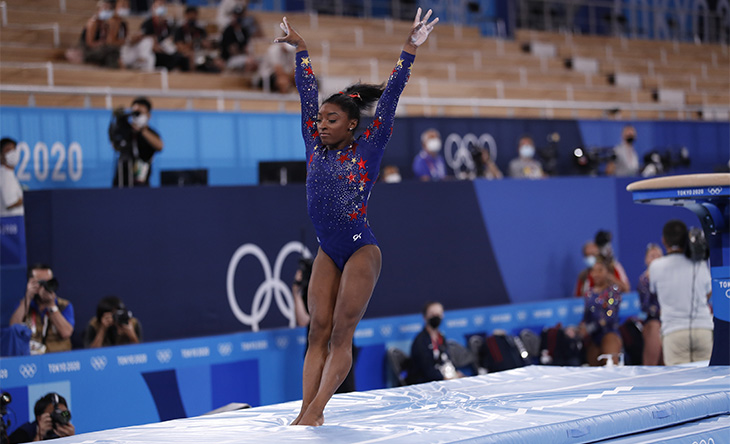
Related Readings
- Faustin’s article: Media's Effect on Athletes' Mental Health
- Effect of media on the mental health of elite athletes
- Mental health resources for athletes
- Watch Dr. Faustin talk about her work with Team USA Women’s Gymnastics (video)

